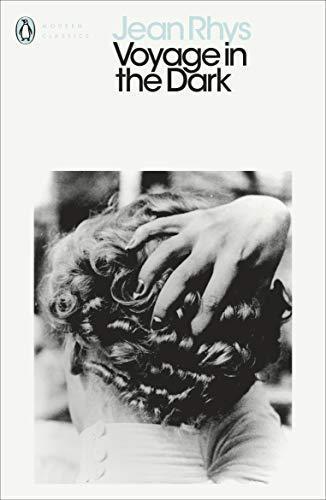ralentina reviewed Voyage in the Dark by Jean Rhys
Don't you hate them? They always clap in the wrong places and laugh in the wrong places.'
4 stars
Content warning Medium spoilers!
Voyage in the dark is the fairly autobiographical account of how Anna, a 19 year old white girl from the Caribbean, navigates her life in England. As a woman of modest means, the choices at her disposal are limited. Since she doesn’t want to spend her whole life working some soul-destroying job while living in near-misery, she can either offer herself to wealthier men in exchange for favours and money, or she can marry, entering a similar deal but with only one man.
Or maybe even that is not entirely a choice, because by the time we encounter her she’s already not really marriage material, at least not for men who can afford the luxuries to which she aspires: fun nights out, nice clothes, a beautiful and warm apartment. So, when she meets Walter, who is gentlemanly and affectionate towards her, but clearly has no serious intentions, she is in. She doesn’t really fall in love with him, but does become enamored with his attentions and the time they spent together so that, when he gets bored, she unravels and, we would now say, engages in self-destructive behaviors, fueled by a depression that remains unnamed. Throughout her voyage in the dark, Anna remembers moments of her life in the Caribbean, where it wasn’t so cold, colours were blighter and her family had power. Anna longs to be back and longs to be black; she idealizes and exoticizes the hell out of the nanny who took care of her as a child, but fully realizes that there was no love there, and that she does not really belonged there any more that she does in England.
Anna (Jean?) is no heroine: she’s damaged, unlikable and self-sabotages at every corner. She is fiercely independent, but cannot help pining after men, for both the romance and money they can offer. She can see through the hypocrisy of British society, its classism and racism, its moralism – but is fundamentally preoccupied by how they affect herself, has no bandwidth to look beyond that. How very honest and believable. How tragic.
Beautiful writing, sparing and precise, with a lot of meaning conveyed through details: the patterns of the wall paper, the prints hanging from the wall, or the shoes people wear. Take this passage: The cinema smelt of poor people, and on the screen ladies and gentlemen in evening dress walked about with strained smiles. 'There! ' Ethel said, nudging. 'D' you see that girl - the one with the band round her hair? That' s the one I know; that' s my friend. Do you see? My God, isn' t she terrible? My God, what a scream! ' 'Oh, shut up, ' somebody said. 'Shut up yourself, ' Ethel said. I opened my eyes. On the screen a pretty girl was pointing a revolver at a group of guests. They backed away with their arms held high above their heads and expressions of terror on their faces. The pretty girl's lips moved. The fat hostess unclasped a necklace of huge pearls and fell, fainting, into the arms of a footman. The pretty girl, holding the revolver so that the audience could see that two of her fingers were missing, walked backwards towards the door. Her lips moved again. You could see what she was saying. 'Keep'em up . . . . ' When the police appeared everybody clapped. When Three-Fingered Kate was caught everybody clapped louder still. 'Damned fools, ' I said. 'Aren' t they damned fools? Don't you hate them? They always clap in the wrong places and laugh in the wrong places.'


